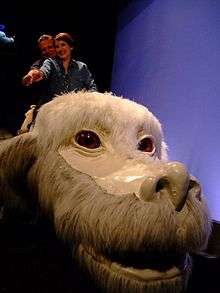Bavaria Film
Coordinates: 48°04′00″N 11°33′00″E / 48.0667°N 11.5500°E
| GmbH | |
| Industry | film industry |
| Founded |
as Münchener Lichtspielkunst AG (1919) as Bavaria Film AG (21 September 1932) |
| Founder |
Peter Ostermayr Wilhelm Kraus |
| Headquarters | Grünwald, Munich, Germany |
Key people |
Dr. Matthias Esche Achim Rohnke |
Number of employees | 242 (2011) |
| Website | www.bavaria-film.de |
Bavaria Film in Munich, Germany is one of Europe's largest film production companies, with some 30 subsidiaries.[1] [2]
History
The studios were founded in 1919, when Munich-raised film producer Peter Ostermayr converted the private film company he had started in 1907, Münchener Lichtspielkunst GmbH, to the public company Münchener Lichtspielkunst AG (Emelka), and acquired a large area (ca. 356.000 m²) for the studios in Geiselgasteig, a district of Munich's southern suburb Grünwald. The company was a direct competitor to UFA, which had started in Berlin in 1917, and quickly absorbed several other film industry companies in the region. In 1930 investor Wilhelm Kraus and a consortium of banks bought a major shareholding in the company, and on 21 September 1932 the group took control of the company and renamed it Bavaria Film AG. In 1938 the Bavaria Film was nationalised but privatised again in 1956.
Films shot at Bavaria Film

Alfred Hitchcock made his first film, The Pleasure Garden, in Geiselgasteig in 1925. In 1934 Peer Gynt was made there. The studios have been used by numerous famous directors, such as Elia Kazan (Man on a Tightrope, 1952), Max Ophüls (Lola Montès, 1954), Stanley Kubrick (Paths of Glory, 1957), Richard Fleischer (The Vikings, 1958), John Huston (Freud: The Secret Passion, 1960), Robert Siodmak (L'Affaire Nina B, 1960), Billy Wilder (One, Two, Three, 1961 and Fedora, 1978), John Sturges (The Great Escape, 1963), Robert Wise (The Sound of Music, 1965), Orson Welles (The Deep, 1967), Jerzy Skolimowski (Deep End, 1970), Mel Stuart (Willy Wonka & the Chocolate Factory, 1971), Bob Fosse (Cabaret, 1972), Wim Wenders (Ein Haus für uns (2 TV episodes), 1974), Ingmar Bergman (The Serpent's Egg, 1977), Robert Aldrich (Twilight's Last Gleaming, 1977), Wolfgang Petersen (Enemy Mine, 1985), Claude Chabrol (The Bridesmaid, 2004), and Oliver Stone (The Snowden Files, 2015).[3]
The Studios in Geiselgasteig are the reason why Munich has become a famous site of crime in TV fiction (in opposite to real life), with detectives like Derrick, The Old Fox, and Der Kommissar investigating. Also Monty Python worked in Geiselgasteig in 1971 and 1972 for Monty Python's Fliegender Zirkus, the specials for German and Austrian television.
The Bavaria Film GmbH is a film production company well known for their television films, such as Rainer Werner Fassbinder's Berlin Alexanderplatz (1980) and Wolfgang Petersen's Das Boot (1981), both also shown theatrically.
Also other production companies have produced films in the Bavaria studios, including Constantin Film, for example for Petersen's The Neverending Story (1984), Oliver Hirschbiegel's Downfall (2004) and Tom Tykwer's Perfume: The Story of a Murderer (2006).[4]
Bavaria Filmstadt
The Filmstadt is an attraction offered for tourists. Visitors taking the tour see sets and props from The Neverending Story, Das Boot, Marienhof, and many more.
References
- ↑ Bavaria Film: Company Profile Retrieved 2013-04-11
- ↑ Bavaria Film: Bavaria Film and its Subsidiaries Retrieved 2013-04-11
- ↑ Bavaria Film – History for more than 90 years
- ↑ "Perfume: The Story of a Murderer Production Notes" (Press release). Pathé Distribution. Archived from the original (RTF) on December 11, 2009. Retrieved December 11, 2009.